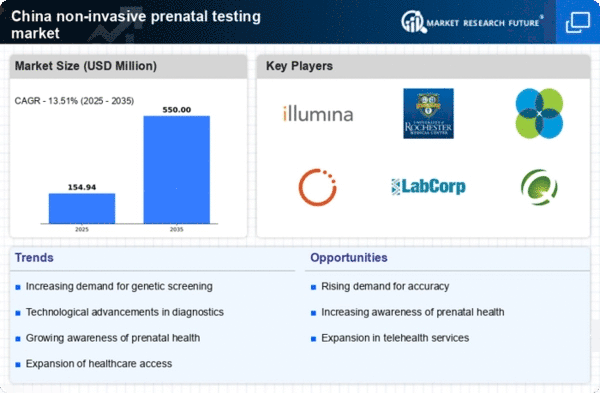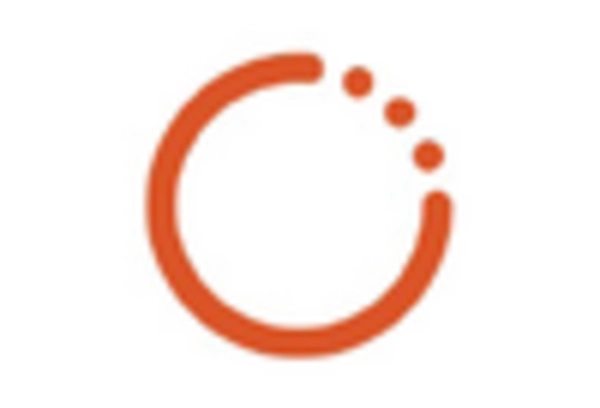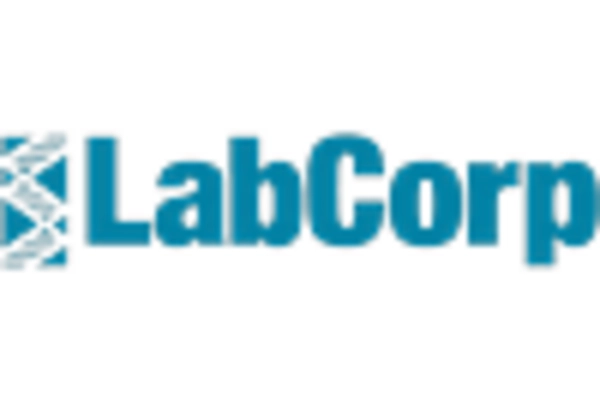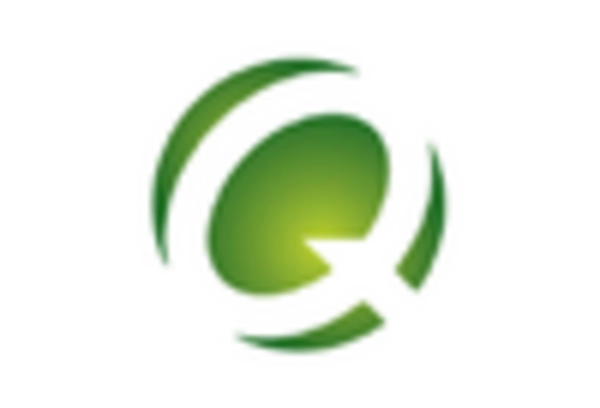Rising Birth Rates
The non invasive-prenatal-testing market in China is experiencing growth due to rising birth rates, particularly in urban areas. As families increasingly opt for having children later in life, the demand for prenatal testing services has surged. In 2023, the birth rate in China was approximately 1.3 million births, indicating a potential market expansion. This demographic shift is likely to drive the adoption of non invasive prenatal testing, as parents seek to ensure the health and well-being of their children. The increasing number of pregnancies, especially among older mothers, necessitates advanced testing options, thereby propelling the non invasive-prenatal-testing market forward. Furthermore, the cultural emphasis on healthy pregnancies and the desire for early detection of genetic disorders contribute to this trend, suggesting a robust future for the industry.
Government Initiatives
Government initiatives aimed at improving maternal and child health are significantly influencing the non invasive-prenatal-testing market in China. The Chinese government has implemented various policies to promote prenatal care and early detection of genetic disorders. For instance, the Healthy China 2030 initiative emphasizes the importance of maternal health, which includes access to advanced prenatal testing. In 2023, funding for maternal health programs increased by 15%, facilitating greater access to non invasive prenatal testing services. These initiatives not only raise awareness but also encourage healthcare providers to adopt innovative testing methods. As a result, the non invasive-prenatal-testing market is likely to benefit from increased government support, leading to enhanced service availability and improved health outcomes for mothers and infants.
Increased Accessibility
Accessibility to non invasive prenatal testing services is improving in China, contributing to the growth of the market. With advancements in telemedicine and the expansion of healthcare facilities, expectant parents are finding it easier to access these essential services. In 2023, the number of healthcare providers offering non invasive prenatal testing increased by 25%, reflecting a growing recognition of the importance of prenatal care. Additionally, urbanization has led to the establishment of specialized clinics that focus on maternal health, further enhancing service availability. This trend suggests that as more parents gain access to non invasive prenatal testing, the market is likely to expand, driven by the demand for convenient and reliable testing options.
Technological Innovations
Technological advancements play a crucial role in shaping the non invasive-prenatal-testing market in China. The introduction of cutting-edge technologies, such as next-generation sequencing (NGS), has significantly improved the accuracy and reliability of prenatal tests. In recent years, the market has seen a rise in the adoption of these technologies, with NGS-based tests accounting for over 60% of the total market share in 2023. This trend indicates a growing preference for non invasive methods that minimize risks to both mother and fetus. Additionally, the integration of artificial intelligence in data analysis enhances the efficiency of testing processes, further driving market growth. As technology continues to evolve, it is expected that the non invasive-prenatal-testing market will expand, offering more comprehensive and accessible testing solutions to expectant parents.
Growing Health Consciousness
The increasing health consciousness among expectant parents is a driving force behind the non invasive-prenatal-testing market in China. As awareness of prenatal health issues rises, more parents are seeking reliable testing options to ensure the well-being of their unborn children. Surveys indicate that approximately 70% of expectant parents are now aware of non invasive prenatal testing options, a significant increase from previous years. This heightened awareness is likely to lead to a greater demand for non invasive testing services, as parents prioritize early detection of potential health issues. Furthermore, the cultural shift towards proactive health management is expected to sustain the growth of the non invasive-prenatal-testing market, as more families recognize the benefits of early intervention and informed decision-making.
















